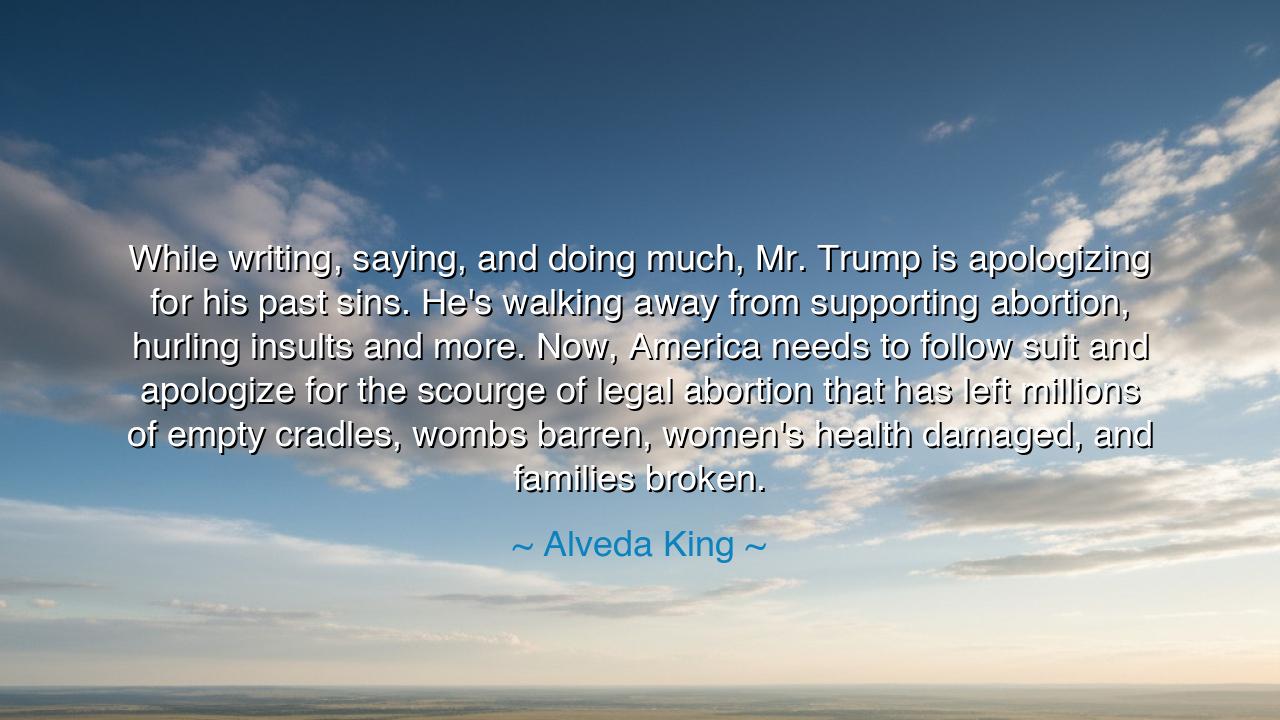
While writing, saying, and doing much, Mr. Trump is apologizing
While writing, saying, and doing much, Mr. Trump is apologizing for his past sins. He's walking away from supporting abortion, hurling insults and more. Now, America needs to follow suit and apologize for the scourge of legal abortion that has left millions of empty cradles, wombs barren, women's health damaged, and families broken.






Hear the voice of Alveda King, niece of the great Martin Luther King Jr., who speaks not only with the passion of an activist, but with the sorrow of one who has seen generations marked by struggle and loss: “While writing, saying, and doing much, Mr. Trump is apologizing for his past sins. He's walking away from supporting abortion, hurling insults and more. Now, America needs to follow suit and apologize for the scourge of legal abortion that has left millions of empty cradles, wombs barren, women's health damaged, and families broken.” These words are heavy with grief and conviction, for they call a nation to repentance, to acknowledge what she names as wounds inflicted upon herself by law and culture alike.
When King speaks of apologizing for past sins, she invokes an ancient principle: that confession and turning away are the first steps toward renewal. She frames Mr. Trump’s change of stance as a symbol—a man once walking one road, now choosing another. But she calls for more than personal change; she calls for collective repentance, for the soul of a nation to awaken and say, “We were wrong.” For without acknowledgment of error, there can be no true healing.
The heart of her lament lies in the scourge of legal abortion. To King, abortion is not merely a matter of private choice but a wound upon society itself, one that has left what she describes as “millions of empty cradles.” The imagery is deeply evocative—nurseries without laughter, families without children who might have been. She ties this sorrow to broader consequences: barren wombs, women’s health damaged, families broken. Whether one agrees or not with her stance, the force of her words reflects a conviction that abortion leaves more than physical scars; it leaves spiritual and communal ones as well.
History offers a reflection in the story of Roe v. Wade (1973), the landmark Supreme Court decision that legalized abortion across the United States. For decades since, the nation has been divided, with some celebrating the decision as a victory for women’s autonomy, and others mourning it as a loss of unborn life. King’s words are born out of this long struggle, echoing the voices of those who see Roe not as liberation but as tragedy. In her eyes, the law itself became a form of what Bastiat once warned against: legal despotism—a decree that, though clothed in legality, sanctioned what she sees as injustice.
Her cry is not merely political but moral and spiritual. She places the burden upon America as a whole, declaring that the nation must “follow suit” in repentance. To her, this is no private wound, but a collective one, staining the conscience of the land. Just as nations have apologized for slavery, for the displacement of native peoples, and for other past wrongs, so too she demands an acknowledgment of sorrow for what she sees as the loss of unborn generations.
The meaning of her words, then, is deeply evocative and motivational. She seeks not only to condemn, but to call forth transformation. Repentance, in her vision, is not an end in itself, but the beginning of restoration: healing for women, renewal for families, and hope for the unborn. Her words point to a future where, by admitting the past, a society may choose differently going forward.
Children of tomorrow, take this teaching into your hearts: whatever your stance, do not walk blindly in matters of life, justice, and conscience. Examine deeply the impact of the laws you live under, and weigh them not only by their legality but by their morality. If you see harm, speak it; if you see sorrow, acknowledge it; if you see wrong, do not be silent. For a people who refuse to confront their wounds will pass them on to their children.
And so, the wisdom of King’s words endures: that repentance is the beginning of healing, and that nations, like individuals, must face their sins with courage. Whether in matters of life, justice, or mercy, may you learn to confront the hardest truths, to seek restoration, and to live with compassion for the weakest and most vulnerable. Only then will the land know peace, and only then will its people find renewal.






AAdministratorAdministrator
Welcome, honored guests. Please leave a comment, we will respond soon